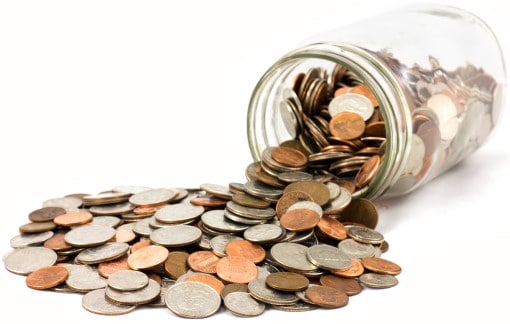
Strapped for cash and can’t afford a sleep study? How to improve your sleep on the cheap
By Jason Wooden, PhD | Updated November 2023
If you can’t afford a sleep study because you don’t have insurance and you’re strapped for cash, you still have options.
In this article, we list the things you can do on the cheap to improve your sleep – practical insomnia remedies, seeing a doctor without insurance to check for underlying problems, and sleep apnea treatments at low or no cost.
Too much at stake to do nothing…
So, you’re strapped for cash and looking for cheap insomnia remedies to improve your sleep?
You’re not alone if you’re sick and tired of waking up feeling tired.
Every night millions of people struggle with poor sleep – 1 in 3 adults in the US and over 30% of the adults worldwide.
When it happens night after night, it can really put a damper on life.
Chronic insomniacs have a hard time focusing and remembering things. When combined with low energy, it’ hard to get things done at home, in school, or on the job.
You’re also more at risk for depression and anxiety.
And let’s not forget the toll this can take on relationships…
All of this makes it important to do something about your poor sleep sooner rather than later.
If you’re desperate for answers and don’t have insurance to see a sleep specialist, it’s understandable if you feel stuck.
However, even if money is tight and you can’t afford a sleep study, there are still plenty of things you can do.
Right now, sleep fixes such as a new mattress or white noise machine may be too expensive.
Let’s talk about what you can realistically do on the cheap for better nights.
Home remedies to improve your sleep on the cheap
1) Practice good sleep hygiene
Similar to other things in life, your everyday habits can make or break your sleep. Sleep hygiene is what you do during the day, evening, and at bedtime that can set the stage for quality sleep.
It involves your sleep habits and sleep environment. Believe it or not, these habits can make a big difference for keeping your sleep on track.
Sleep hygiene tips
- Keep consistent wake up and sleep times
- Avoid naps
- Exercise during the day
- Avoid large meals, alcohol, or stimulants such as caffeine before bedtime
- Maintain a bedtime routine to wind down
- Avoid using TVs, laptops, or other electronics before sleep
- Keep your sleep environment dark, cool, quiet, and relaxing
2) Change what you eat (and drink) in the evening
What you eat for dinner and snack on at night can really come back to bite you. Stay away from caffeine-rich dark chocolate sweets, spicy foods, refined carbs, protein-rich and fatty foods, aged foods, and alcohol.
Eat more sleep friendly foods that contain sleep promoting nutrients such as melatonin, calcium, magnesium, and vitamin B.
3) Stay active
Resist the dark side and becoming a couch potato. A sedentary lifestyle has been linked to poor sleep, weight gain, and depression.
Physical activity is known to improve sleep quality. It can make it easier to fall asleep, stay asleep, and sleep more deeply.
Physical activity can also help with chronic pain, a notorious sleep wrecker. So, be sure to get out every day for a brisk walk or some other activity.
4) Get more natural daylight
Your body is in tune with day and night through sleep-promoting hormones which help regulate your sleep-wake cycle. Sunlight signals the body to stop making hormones like melatonin which generally falls during the day and rise as it gets dark.
Sleep experts recommend you get at least 30 minutes natural daylight each day. Try getting out for a walk and spending some time in the yard.
5) Try white noise
Do you sleep in a noisy bedroom environment? Maybe you’re dealing with a snoring a bed mate, noisy neighbors, or live next to a busy freeway.
White noise can help mask those sounds so you can fall asleep and keep your slumber from getting disturbed.
One old fashion trick is to run a household fan.
For something more sophisticated, you can try one of these free online white noise generators:
You can also try one of the free white noise phone apps below.
6) Try a free smart phone sleep app
There’s a wide variety of phone apps designed to help with specific sleep issues.
Track and improve your sleep:
Relax and fall asleep faster with hypnosis and meditation:
Sleep Well Hypnosis
Uses hypnosis and calming sounds to help reduce anxious thoughts and promote deeper sleep.
White noise to help mask nuisance noise:
7) Try an at home stress buster
Stress and anxiety are bad for sleep. Since poor sleep can make both of them worse, you can get into a vicious cycle if you’re not careful.
Stress is also bad for your health. It’s been linked to ulcers, heartburn, a weakened immune system, and other various things you don’t want.
8) Try a natural sleep aid
Speaking of stress, we’re learning a lot about natural actives that reduce stress and anxiety. Many you can get online or at your local store.
Among the better known ones are valerian root extract, lavender essential oils, chamomile, and CBD oil.
Before trying out a natural supplement, it’s strongly recommended that you check with your doctor and an alternative medicine specialist such as a naturopathic physician.
They can advise you about whether it’s right for you, possible side effects and drug interactions, dosing, and the best way to take it.
Know when to see a doctor
We’ve talked about some of the cheap insomnia remedies you can try at home if you can’t afford a sleep study.
Many are things you can do for free or at minimal cost to improve your sleep.
As you’re doing this, it’s still important to figure out what you can do to see a doctor.
If you’re wondering why, it’s important to keep in mind that sleep can be affected by a lot of different things.
For chronic insomniacs, often there can be something more serious going on with their health that causes sleep problems.
- Many health conditions have been linked to poor sleep. The list is long and includes things like arthritis, asthma, chronic pain, diabetes, and heart disease.
- Many pain meds contain opiates and caffeine which can cause sleep issues. (You can read more about this here.)
- You might have an underlying sleep disorder such as obstructive sleep apnea
Sleep hygiene and the other remedies I’ve listed will only get you so far if you don’t deal with these underlying issues.

You can start with taking a free online sleep assessment:
However, you still need the help of a doctor to get to the bottom of things.
Some places you can go if you don’t have insurance include (US only):
Look for a health center that provides care on a sliding fee scale
Check if you can enroll in a health plan through the Affordable Care Act
How to get a sleep test and treatment if you can’t afford a sleep study?
Sleep studies is how sleep specialists diagnose underlying sleep disorders.
The most common is obstructive sleep apnea, a sleep-related breathing disorder that affects over 18 million adults in the US and almost a billion worldwide. Unfortunately, many people are living with undiagnosed sleep apnea.
Treating sleep apnea without insurance can be tough since you need an overnight sleep study for diagnosis and a doctor’s prescription.
If you pay out of pocket, a sleep study can cost from $1000 to $2000. A basic CPAP setup, the gold standard for treating sleep apnea, can run you around $1000.
The good news is today you still have options if you can’t afford a sleep study.
Contact a sleep clinic:
Some sleep centers have federal funds or grants to serve uninsured, low income, or unemployed people. Others may discount the price for you.
Speak with a manager of a sleep center and explain your situation.
Participate in a clinical study:
You may be able to get a free overnight sleep study while taking part in a sleep-related clinical trial.
A couple places to check:
ClinicalTrials.gov – A government database of clinical studies.
MyClinicalTrial.com – A non-government database of clinical studies.
Try entering search terms such as “sleep study” or “polysomnogram”, look for a study near you that’s recruiting, and contact them about your interest in being a participant.
In-home sleep study:
Some online companies offer remote lab testing which can be cheaper than an overnight sleep test. An in-home test kit currently costs $200-$300 and can include a prescription if needed.
You may also be interested in:
Connect with us:
About Us
Better Sleep Simplified® was founded as a place for you to get clear and well-researched information.
Our goal is to make sure you know about your options so that you take action sooner rather than later.
Check us out on YouTube:
Watch and Learn
Helpful sleep tips, interesting sleep facts and statistics you want to know about
Affiliate Disclosure
This site is a participant in the Amazon Services LLC Associates Program and other affiliate advertising programs designed to provide a means for sites to earn advertising fees by advertising and linking to them.
Important: BetterSleepSimplified.com is for informational purposes only and is not intended or implied to be a substitute for professional medical advice, diagnosis, or treatment. Always consult a physician for sleep and health concerns. See additional information.
